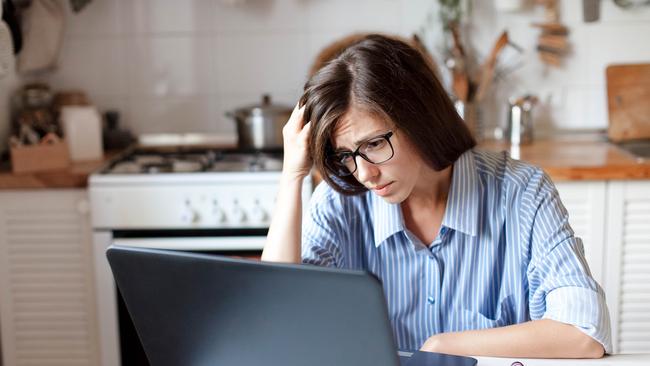Australians’ mental health worse now than in Covid-19 lockdowns, says KPMG, Smiling Mind report
The RBA hiking up interest rates, heightened geopolitical tensions and frequent natural disasters are all making life more stressful than lockdowns.

Life has become more stressful than Covid-19 lockdowns, a report has found, with Australians’ mental health levels plunging amid heightened geopolitical instability, the Reserve Bank’s rapid interest rate rises and a series of natural disasters.
On Friday, KPMG and Smiling Mind will launch the Australian Wellbeing Index, which shows workers suffering from a different kind of long Covid-19.
The index shows people have experienced a decline in their social connections as they become more isolated and less connected with their social networks as the pandemic enters its third year. Covid-19 has sparked a shift to remote or hybrid working, where being at the office full-time from 9am to 5pm is no longer necessary and neither is taking the humble “sickie” – even if you are unwell. Employees have managed to structure their work days around home life, rather than the other way around, erasing the need for “unplanned absences”.
Unions have also weighed in, stepping up demands on employers to better protect workers by ensuring all employees who can work from home do so, going further than advice released by the country’s leading doctors.
While many have welcomed this new-found flexibility, others have struggled with inconsistent policies among employers, heightening anxiety levels, the index found.
Andrew Dempster, KPMG’s mental health advisory lead, said workers were feeling a lack of control as the RBA embarks on its most aggressive series of interest rate rises since 1994; war continues to rage in Ukraine, driving up the cost of fuel and food; and China flexes its military muscle following Nancy Pelosi’s visit to Taiwan this week.

“With the background of global political instability and some of the natural disasters that we are having on a very regular basis, there is a general feeling that people have of limited control in the broader environment,” Mr Dempster said. “What that means in the workplace … is if I’ve got to work today, do I as an individual have some control over when I do it, how I do it and the way it’s done?”
Mr Dempster said this did not necessarily mean offering more leave or cutting hours. He said meaning and purpose in job tasks were also important.
The pandemic has also made the role of line managers more difficult, which has affected employee mental health. “The glue that really does hold it all together is the quality of the managers,” Mr Dempster said.
“Those structures have fallen away over the last two years where people work remotely. There might be tactical conversations during the day about particular things but there’s not that sort of walk past the desk or walk around the office or see them in the lunchroom or just those incidental kind of connections that we would have otherwise had.”
The Australian Wellbeing Index slipped 0.9 percentage points to 48.6 out of a total of 100 in the first quarter of the year compared with the same period in 2021. Data was collected from 226,103 people, who completed more than 880,954 surveys. Key factors contributing to a low wellbeing score include more people experiencing challenges with stress (40 per cent), focus and concentration (43 per cent) and sleep (34 per cent).
Human resources bosses at some of Australia’s biggest companies told The Australian last week that maintaining employee wellbeing was the biggest challenge in the shift to working from home.
But Smiling Mind chief executive Addie Wootten said employers could reap the benefits if they get the balance right, particularly in a tight labour market. “Businesses are really struggling with staff turnover. So if you want to link it to an economic benefit, if you can engage your staff and keep them retained, it’s going to save the business a lot of money and also productivity and performance will go up,” Dr Wootten said.




To join the conversation, please log in. Don't have an account? Register
Join the conversation, you are commenting as Logout